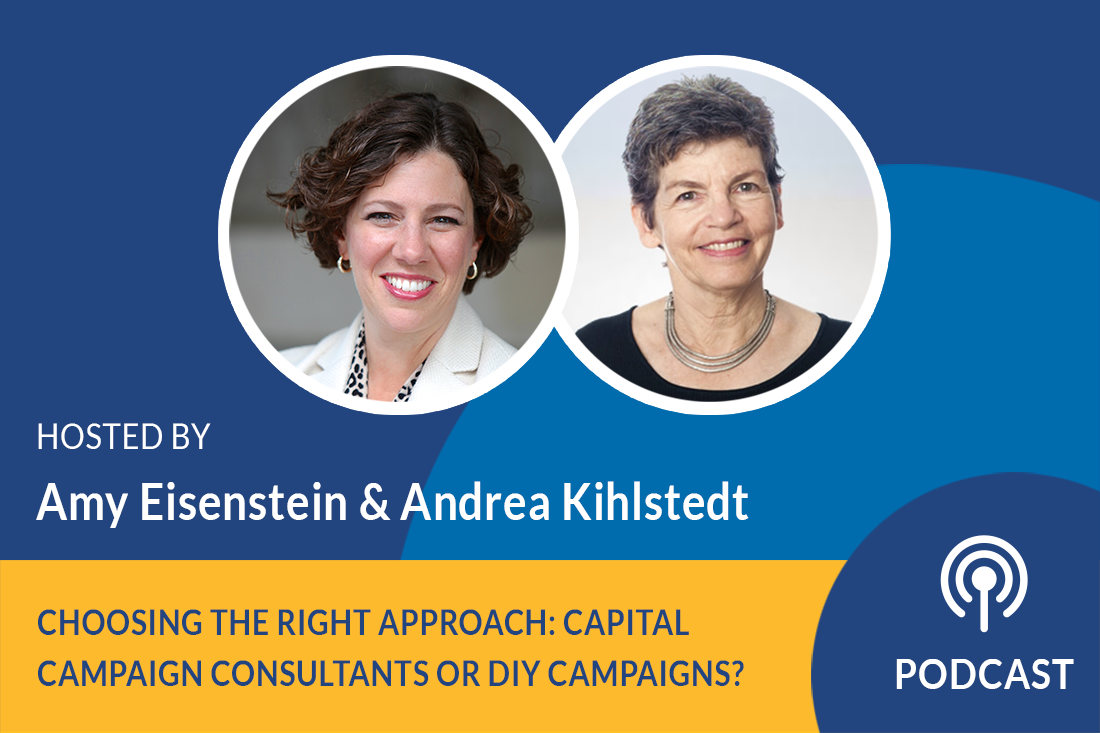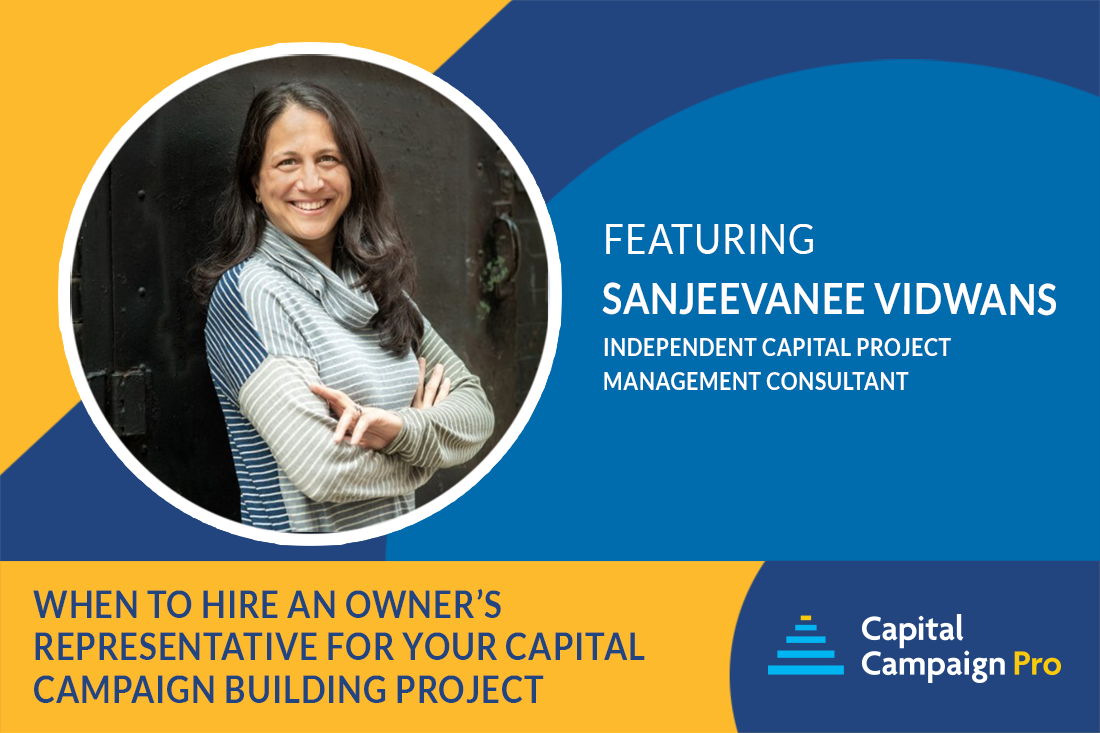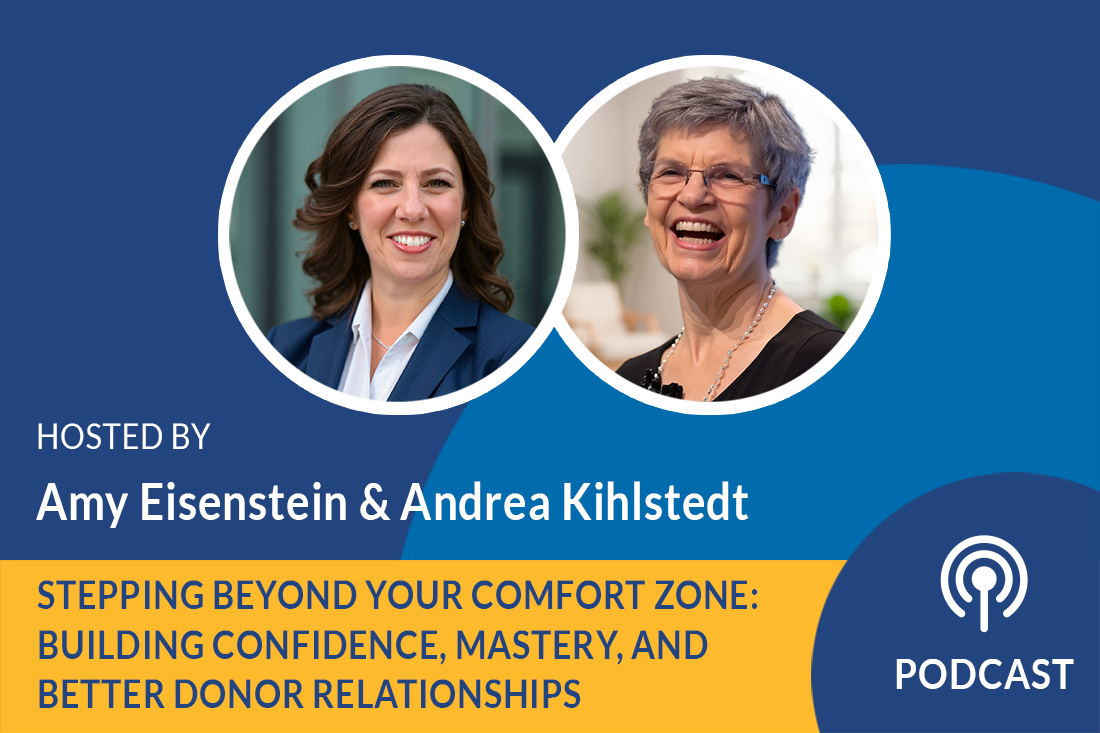Podcast: Choosing the Right Approach: Capital Campaign Consultants or DIY Campaigns?

Season 3, Episode 40
In this episode, hosts Amy Eisenstein and Andrea Kihlstedt explore the age-old question: Do you really need a consultant for your capital campaign? They delve into the pros and cons of hiring a consultant for your campaign and provide valuable insights to help you make an informed decision. They also share their extensive experience and evolving perspectives on the role of consultants in capital campaigns.
If you’re curious about the future of capital campaigns and want to explore innovative alternatives, visit www.capitalcampaignpro.com. You’ll find information on their DIY support system, consulting options, and an array of free resources to help you make informed decisions about your campaign strategy.
Listen Now:
Amy Eisenstein:
Do you really need a consultant for your capital campaign? We are going to talk about the pros and cons of hiring a [campaign] consultant for your campaign. Stick around.
Hi, I’m Amy Eisenstein, Capital Campaign Pros CEO and co-founder, and today, I have with me my colleague, my co-founder, my co-conspirator, Andrea Kihlstedt. We are going to talk about the pros and cons and the do’s and don’ts of deciding whether or not you need a campaign consultant for your campaign.
Andrea, you want to get us started?
Andrea Kihlstedt:
Sure. Amy, you and I have been thinking about this a long time as we developed Capital Campaign Pro, and recently our thinking has changed a bit about this subject. About whether people really… What they need, what kind of expertise they need, if they’re going to have a campaign.
Hiring a Campaign Consultant vs. Doing-it-Yourself
The traditional model, of course, is if you’re going to do a capital campaign, you go and you hire a consultant to do a feasibility study, and then you hire a consultant to guide you through your campaign. That’s the way things were for years.
Then we came along with Capital Campaign Pro and we developed a slightly different model, where we do this work virtually and we offer, we have online resources, a really very well-developed set of online resources and expert advisors who guide people virtually.
Amy Eisenstein:
Well, let’s tell listeners how we got started. In fact, we decided to provide a toolkit. An online toolkit of samples and templates to help pull back the curtain on capital campaign consulting expertise. So really it was our goal from the beginning to give people tools and resources and let development directors and executive directors have access to some of the critical tools that are used by campaign consultants.
So that’s sort of where we started on this journey of trying to figure out how to help nonprofit leaders access campaign support in different ways. So you referenced we’re virtual. That is not a function of covid. It’s because we’re leveraging technology in order to provide more effective and accessible campaign support.
So I guess it all stems from the idea that we want to empower nonprofit leaders to lead successful campaigns, and we’re questioning how much campaign consulting does a nonprofit really need. That’s where this comes from.
Andrea Kihlstedt:
Right. That’s right. The whole first five years that we’ve been in business, we have leaned on providing expertise. More recently, we have gone into this question seriously about:
Well, if an organization has people who are really capable in their development shop and they have a strong executive director and they really wonder if they need to pay for campaign consulting to do this. Can’t they do it themselves?
We’ve really started to lean into that and recently we’ve developed, I think of it as a suite of materials or a way to approach it so that people can do campaigns by themselves, but with the kind of support they need. So they’re not going to find themselves in trouble.
Capital Campaigns that have Stalled without Proper Support
Now, we hear with some frequency from organizations that are in trouble with their campaigns. They didn’t know what they were doing. They didn’t hire a consultant, they didn’t have resources. They went and they did it kind of ass-backwards. Lo and behold, they call us up because they’re in the middle of their campaign and they haven’t made progress and they’re stalled. We don’t want that to happen.
So we say, well, what do people need if they’re going to do campaigns themselves, but what do they need to provide them with enough material and enough resources to be able to have pretty good chances of success even without a consultant?
That’s what I think we’ve finally come up with. It’s actually quite exciting.
Amy Eisenstein:
That’s right. I mean, honestly, we have come a long way from our original idea of this online toolkit, because we have found that most organizations need some support and guidance. Some expertise, some bouncing-off-of question asking.
Two Levels of DIY Capital Campaign Support
So we have come up with two levels of support really and the first level we talk about as a do-it-yourself support system. I mean, it is for organizations that decide that they don’t want to or don’t need to hire a full-on campaign consultant. But we don’t want them making it up or reinventing the wheel. Campaigns have real strategy, they have real best practices, and we want to give those to people so that they don’t find themselves stuck in the middle of the campaign.
Because I think organizations that really don’t have the expertise, they don’t access support. They often find themselves, they’ll call us two years into fundraising and say:
“Oh my gosh, we’re at 30 or 40% of our goal. The first 30% was super easy. The first 10 gifts were easy and now we’re stuck.”
So we don’t want anybody to be in that position. We want you to plan well. We want you to have good strategy. So in addition to this online toolkit, this portal of resources…
- We have weekly group coaching.
- We have peer support.
- We have an email helpline.
- And we have training — online training for our members, solicitation training, board training, [and] CEO roundtables.
So that people aren’t out there swinging in the wind, truly, truly doing it themselves with no expertise, and no roadmap, and no guidance and no support.
Andrea Kihlstedt:
Well, it’s actually super-exciting to have figured this out. I feel like we have broken new ground in the field by having taken seriously the people who really don’t want to spend 10, 20, $30,000 a month on a consultant. Who say:
“Listen, that’s a quarter of a million dollars just in consulting fees. We don’t really want to do that for this campaign. What can we do where we’ll still be on firm footing?”
We can provide a lot of what they need without hiring an expensive consulting firm. So, we are super-excited about it. We have more and more people signing up for it, and we are learning more and more what they actually do need. What kind of support we can provide for them.
Weekly Group Support
We have weekly small group calls, which I have to say I’ve come to love. Every week we have a number of small group calls and people come to those calls regularly. They sign up for one call or another, and they bring their questions to those calls. Then we have two experts leading those calls and we have brainstorms to answer their questions. The experts guide the discussion and people learn from one another from the questions they bring to the table.
So it’s almost as though the people who work with us at this sort of do-it-yourself or non-consultant level are part of a thought leader group and they’re partners with us. Rather than having us be outside expert, we bring them in as partners providing this really remarkable online resource of material for every phase of the campaign.
These weekly group calls where they get to know other people in the field who are doing campaigns and these regular trainings that we’ve really gotten quite good at doing. I think those are terrific resource, and it’s all remarkably affordable, I mean, when you look at and compare it to how much it costs to hire a consultant.
Amy Eisenstein:
I mean, that’s what we wanted to do. We wanted to equalize access to expertise and campaign support so that you didn’t feel like you had to spend a chunk of your campaign paying for expertise.
But to me, what’s remarkable about these weekly peer support and group coaching calls is that people hear questions asked that they didn’t even know to ask. I mean, to me, that’s the magic of it. They don’t just get an answer from one expert or another. They get responses from their peers all around the country who are leading campaigns.
So how did you find your campaign chair? Well, this is what we did, and this is what we did, and this is what we did. Now they have three new ideas of how other organizations in the real world with boots on the ground found their campaign chair, or recruited their campaign chair, or solicited their campaign chair. The questions are wonderful and varied each week, so it’s super special.
Changing the Capital Campaign Support Model
So I think our message to organizations is that you may need a consultant, you may need that full level of expertise. Or you may decide you have really competent, capable staff. You are excited, and enthusiastic, and motivated and meet deadlines, and you don’t need a full service campaign consultant.
And yet, there’s no reason for you to be winging this or making it up as you go. After five years of trial and error, honestly, we’ve put into this support system, we’ve developed this support system that started with an online toolkit and grew into network of support.
For organizations that want more advising, and handholding, and one-on-one advice and guidance, we have that too. So we have two levels:
- We have our Do-it-Yourself Essentials support system;
- And we have expert advisors that work one-on-one with clients in an advising capacity as well.
So I think there’s lots of great consulting options out there. That’s the reality. There’s hundreds or thousands of firms out there providing campaign expertise and campaign consulting, and we changed the model. I think that that’s what we’re talking about today, is that so many organizations, the traditional model isn’t the right fit for them.
And we’ve provided something new and we’re just tooting our horns. After so many years of working on this, and now five years in so many successful campaigns under our belt using this new model, it feels really good.
Andrea Kihlstedt:
It really does. Yeah, I’m super proud of us, Amy. Amy, tell people where they should go to learn more about this.
Amy Eisenstein:
Yeah, visit CapitalCampaignPro.com. You’re going to see in the top menu bar our “Do-it-Yourself” model. If you want more support, you can look under “Consulting” and learn about our Guided Feasibility Study model where, you, the leaders of your nonprofit go and interview your donors during the feasibility study process. The reality is we have tons of free resources too. So I hope that every listener will go visit capitalcampaignpro.com and see what we have to offer.
So Andrea, hopefully people now have a way to think about do we need a full service campaign consultant? Do we want to lean more do it yourself? But regardless, we don’t want to see stalled campaigns and failed campaigns in the middle.
So truly — doing it without any expertise, guidance, support or systems is just not a good idea.
Andrea Kihlstedt:
Right. That’s really not a good idea. And now you have some really viable alternatives. So talk to us, come look at our site. There are various places on the site where you can sign up for a strategy session with us to discuss that. So we would be happy to talk to you.
Amy Eisenstein:
And answer your questions.
All right. Thanks for joining us. We’ll see you next time.



Leave a Comment